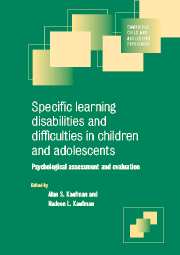 Specific Learning Disabilities and Difficulties in Children and Adolescents
Specific Learning Disabilities and Difficulties in Children and Adolescents Book contents
- Frontmatter
- Contents
- List of contributors
- Preface
- Part I History and Tradition
- Part II Alternative Cognitive Approaches to Learning Disabilities Assessment and Remediation
- 3 Application of the Woodcock—Johnson Tests of Cognitive Ability—Revised to the diagnosis of learning disabilities
- 4 The Kaufman tests — K-ABC and KAIT
- 5 Using the Cognitive Assessment System (CAS) with learning-disabled children
- 6 Application of the Differential Ability Scales (DAS) and British Ability Scales, Second Edition (BAS II), for the assessment of learning disabilities
- 7 Is dynamic assessment compatible with the psychometric model?
- 8 Multi-perspective, clinical—educational assessments of language disorders
- Part III Neuropsychological Approaches to Learning Disabilities Assessment and Remediation
- Part IV Integration and Summation
- Index
3 - Application of the Woodcock—Johnson Tests of Cognitive Ability—Revised to the diagnosis of learning disabilities
from Part II - Alternative Cognitive Approaches to Learning Disabilities Assessment and Remediation
Published online by Cambridge University Press: 06 January 2010
- Frontmatter
- Contents
- List of contributors
- Preface
- Part I History and Tradition
- Part II Alternative Cognitive Approaches to Learning Disabilities Assessment and Remediation
- 3 Application of the Woodcock—Johnson Tests of Cognitive Ability—Revised to the diagnosis of learning disabilities
- 4 The Kaufman tests — K-ABC and KAIT
- 5 Using the Cognitive Assessment System (CAS) with learning-disabled children
- 6 Application of the Differential Ability Scales (DAS) and British Ability Scales, Second Edition (BAS II), for the assessment of learning disabilities
- 7 Is dynamic assessment compatible with the psychometric model?
- 8 Multi-perspective, clinical—educational assessments of language disorders
- Part III Neuropsychological Approaches to Learning Disabilities Assessment and Remediation
- Part IV Integration and Summation
- Index
Summary
The WJ—R is based on a philosophy that the primary purpose of testing should be to find out more about the problem, not to determine an IQ
(Woodcock, 1997a).The primary objective underlying the development of the tests described in this chapter was to provide clinicians with better and more comprehensive procedures for investigating problems of cognition and learning. The Woodcock—Johnson Tests of Cognitive Ability—Revised (WJ—R COG) (Woodcock & Johnson, 1989) approaches this goal in two ways. First, the WJ—R COG provides a broader array of information about factors that may be related to learning problems than is available through the use of any other single instrument. Second, certain interpretive procedures are especially useful for evaluating the significance and implications of obtained information. Because of these unique features, both the 1977 (Woodcock & Johnson, 1977) and the 1989 WJ—R have been widely used in school and clinical settings for the diagnosis of learning and reading disabilities (Ostertag & Baker, 1984; Dalke, 1988; Cuenin, 1990; Lewis, 1990).
The WJ—R COG is a wide-age-range, comprehensive set of individually administered tests for measuring cognitive abilities, scholastic aptitudes, and oral language that is complemented by the fully co-normed Woodcock—Johnson Tests of Achievement—Revised (WJ—R ACH) (Woodcock & Johnson, 1989).
- Type
- Chapter
- Information
- Specific Learning Disabilities and Difficulties in Children and AdolescentsPsychological Assessment and Evaluation, pp. 55 - 96Publisher: Cambridge University PressPrint publication year: 2001
- 2
- Cited by


